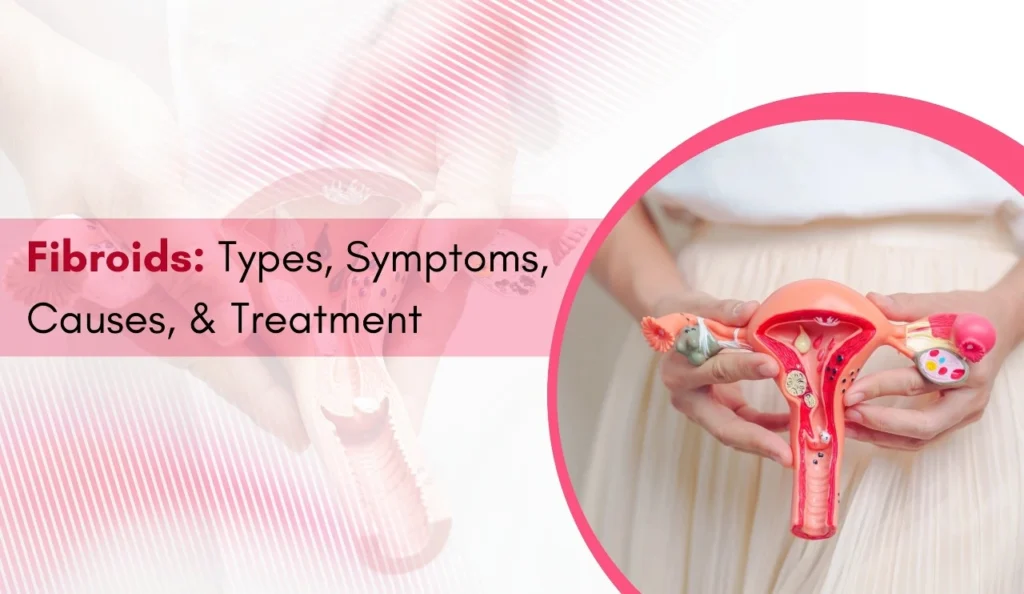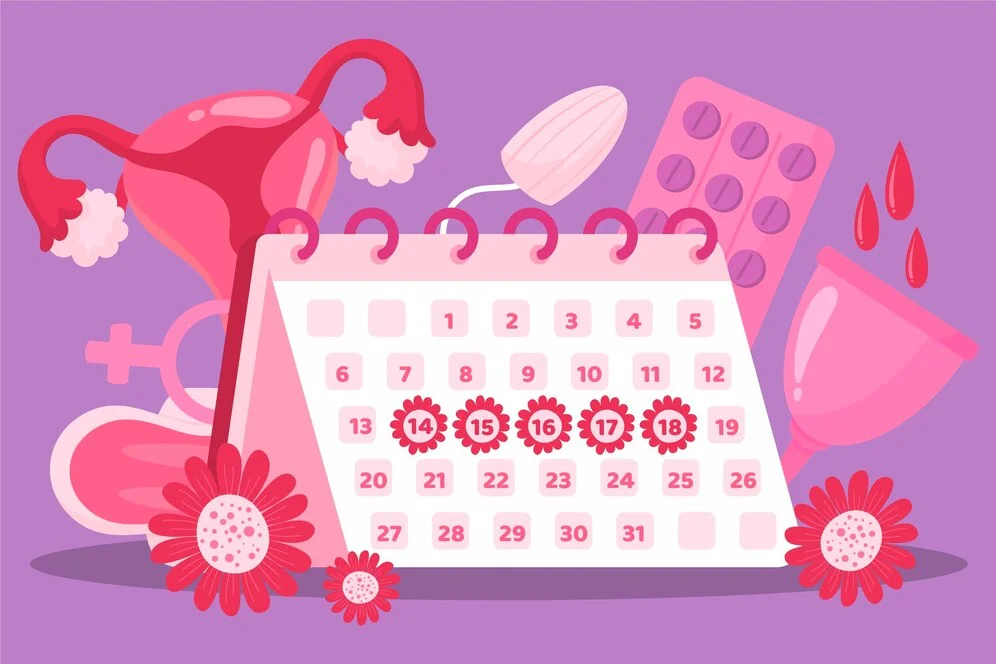-
Ganesh Talkies, Kolkata
Ganesh Talkies, Kolkata

Admin
17.03.2025
Hello Reader! Welcome to the blog page of Dr. Megha Khanna, one of the best lady gynaecologist in Kolkata. Fibroids, also known as uterine fibroids, are non-cancerous growths that develop in or on the uterus. These growths vary in size, from tiny, undetectable nodules to large masses that can distort the uterus. While fibroids are generally benign, they can cause significant discomfort and complications, depending on their size, location, and number. As the best lady gynaecologist in Kolkata, I often encounter patients struggling with symptoms of fibroids, which can disrupt daily life. Understanding the types, causes, symptoms, and treatment of fibroids is crucial for women’s reproductive health. Types of FibroidsSymptoms of FibroidsCauses & Risk Factors of Fibroids1. Hormonal Factors2. Genetic Predisposition3. Lifestyle & Diet4. Other Risk FactorsHow can fibroids impact fertility and pregnancy?Impact on FertilityImpact on PregnancyDiagnosis of FibroidsTreatment of Fibroids1. Medications2. Non-Surgical Procedures3. Surgical OptionsAre there any natural remedies or lifestyle changes that can help manage fibroids?Lifestyle ChangesNatural RemediesAdditional RemediesHow effective is turmeric in managing uterine fibroids?Mechanisms of ActionClinical EvidenceLimitations and Future ResearchPractical UseLifestyle Changes & PreventionCan lifestyle changes alone significantly reduce fibroid symptoms?Specific lifestyle changes that can help:How long does it typically take to see improvements in fibroid symptoms with lifestyle changes?FAQConclusion Types of Fibroids Fibroids are classified based on their location in the uterus: Intramural Fibroids – The most common type, these develop within the muscular wall of the uterus. They may cause an enlarged uterus and heavy bleeding. Subserosal Fibroids – These grow on the outer surface of the uterus and can put pressure on surrounding organs, leading to pelvic pain. Submucosal Fibroids – Found in the inner lining of the uterus, these are known to cause severe menstrual bleeding and fertility issues. Pedunculated Fibroids – These grow on stalk-like structures inside or outside the uterus, sometimes leading to extreme pain if they twist. Symptoms of Fibroids Many women with uterine fibroids experience no symptoms, but when symptoms do occur, they may include: Heavy menstrual bleeding (sometimes with clots) Pelvic pain or pressure Frequent urination due to pressure on the bladder Constipation if the fibroids press against the rectum Pain during intercourse Lower back pain Abdominal bloating or swelling Difficulty conceiving or complications in pregnancy If you experience any symptoms of fibroids, consulting a specialist is essential to determine the best course of action. Causes & Risk Factors of Fibroids Though the exact cause of fibroid...

Admins
17.03.2025
Understanding the causes of irregular periods is essential for maintaining reproductive health. Learn the common reasons behind menstrual irregularities and when to consult a gynecologist for expert guidance. A regular menstrual cycle is a key indicator of a woman's reproductive and overall health. While variations in cycle length are normal, persistent irregularities can signal underlying health issues. The causes of irregular periods can range from hormonal imbalances to medical conditions that require attention. What is an Irregular Period?Common Causes of Irregular Periods 1. Hormonal Imbalance 2. Stress and Lifestyle Factors 3. Polycystic Ovary Syndrome (PCOS) 4. Thyroid Disorders 5. Birth Control and Medications 6. Uterine Fibroids and Polyps 7. Perimenopause and Menopause When to Seek Medical Help for Irregular Periods? How to Regulate Your Menstrual Cycle? Lifestyle Changes Medical TreatmentsFAQs on Irregular Periods 1. Can stress cause irregular periods?2. How do I know if my irregular periods are due to PCOS?3. Can birth control pills regulate my periods?4. Should I be worried if I miss one period?5. How does thyroid affect my menstrual cycle?Prioritizing Your Menstrual Health: Steps for a Balanced Cycle In this guide, we’ll discuss the most common reasons for menstrual irregularities, lifestyle factors that affect your cycle, and when you should seek medical advice. What is an Irregular Period? An irregular period refers to variations in the menstrual cycle that deviate from the typical 21 to 35-day range. Common irregularities include: Missed periods – Skipping one or more cycles Frequent periods – Having periods less than 21 days apart Infrequent periods – Having cycles longer than 35 days Heavy bleeding (Menorrhagia) – excessive blood float at some stage in menstruation Light bleeding (Hypomenorrhea) – Very minimal menstrual flow Spotting between periods – Bleeding that occurs outside the menstrual cycle If these irregularities persist, it’s important to understand the underlying causes and seek medical advice when necessary. Common Causes of Irregular Periods 1. Hormonal Imbalance Hormones play a crucial position in regulating the menstrual cycle. Any disruption in the balance of estrogen and progesterone can lead to irregular periods. Causes of hormonal imbalance include: Polycystic Ovary Syndrome (PCOS) Thyroid disorders (hypothyroidism or hyperthyroidism) Perimenopause (transition phase before menopause) High levels of prolactin (hyperprolactinemia) 2. Stress and Lifestyle Factors Chronic stress affects the hypothalamus, the part of the brain responsible for hormone regulation. Lifestyle factors that contribute to irregular periods include: Excessive physical or emotional stress Sudden weight loss or gain Poor sleep patterns Excessive exercise or...

Admins
12.03.2025
Normal delivery can be overwhelming for many expectant mothers. Learn about common fears, how to cope with them, and the benefits of seeking guidance from one of the best gynecologists. Pregnancy is a beautiful journey, but the thought of labor and childbirth often brings anxiety for many women. While normal delivery is a natural process, the fear of pain, complications, or unexpected outcomes can make it seem daunting. However, with the right knowledge, preparation, and medical support, these concerns can be effectively addressed. Why Do Women Fear Normal Delivery?1. Fear of Labor PainWhy It HappensHow to Cope2. Fear of Complications During ChildbirthWhy It HappensHow to Cope3. Anxiety Over Perineal Tearing or StitchesWhy It HappensHow to Cope4. Fear of Medical InterventionsWhy It HappensHow to Cope5. Concerns About Postpartum RecoveryWhy It HappensHow to CopeHow the Best Lady Gynecologist Can HelpFAQs1. Is normal delivery always painful?2. How can I prepare for a normal delivery?3. What are the benefits of normal delivery over a C-section?4. Can I reduce my risk of tearing during childbirth?5. When should I consult a gynecologist for birth planning?Normal Delivery: Facing Fears and Preparing for a Smooth Birth This article will explore the most common fears about normal delivery, practical ways to overcome them, and the role of expert medical guidance in ensuring a safe and comfortable birthing experience. Why Do Women Fear Normal Delivery? It is natural for first-time mothers, and even those who have given birth before, to experience fear regarding normal delivery. Some of the most common concerns include: Fear of labor pain Anxiety about complications during childbirth Worries about perineal tearing or needing stitches Fear of medical interventions like forceps or vacuum delivery Concerns about postpartum recovery and healing The pressure of handling labor alone While these fears are valid, understanding them and learning ways to manage them can help expectant mothers feel more empowered and in control. 1. Fear of Labor Pain Why It Happens The thought of enduring intense contractions and labor pain is one of the biggest concerns for expectant mothers. Many women worry about how much pain they can tolerate and whether they will need pain relief interventions. How to Cope Educate Yourself on the Stages of Labor: Understanding how labor progresses and what to expect at each stage can help reduce fear. Practice Breathing Techniques: Deep breathing exercises, such as Lamaze and the Bradley method, can help manage pain and keep...

Admins
10.03.2025
Undergoing a Hysterectomy Surgery is a significant step for many women, often essential for treating conditions like fibroids, endometriosis, or chronic pelvic pain. While this procedure can greatly improve your overall health, it’s common for women to experience weight changes afterward. Understanding why weight gain occurs post-surgery and learning how to manage it can help you maintain a healthy lifestyle and feel confident in your body. Why Does Weight Gain Occur After a Hysterectomy Surgery?1. Hormonal Changes2. Reduced Physical Activity3. Emotional Factors4. Metabolism Changes with AgeEffective Strategies to Prevent Weight Gain After a Hysterectomy Surgery1. Focus on Balanced Nutrition2. Adopt a Gradual Exercise Routine3. Manage Hormonal Imbalances4. Manage Stress and Emotional Eating5. Monitor Portion Sizes6. Follow Your Doctor’s AdviceFAQs About Preventing Weight Gain After Hysterectomy Surgery1. How soon can I start exercising after a hysterectomy?2. Is weight gain after a hysterectomy permanent?3. Does hormone replacement therapy (HRT) cause weight gain?4. Are there specific foods to avoid post-hysterectomy?5. How can I manage belly fat after a hysterectomy?Achieve a Healthy Weight After Surgery with Simple Lifestyle Changes Why Does Weight Gain Occur After a Hysterectomy Surgery? Weight gain following Hysterectomy Surgery isn’t uncommon, and several factors contribute to this: 1. Hormonal Changes If your ovaries are removed during the surgery, your body may experience a sudden drop in estrogen. This hormonal shift can slow down metabolism and lead to fat accumulation, particularly around the abdomen. 2. Reduced Physical Activity Post-surgery recovery may limit your movement for a few weeks, reducing your body’s calorie-burning capacity. Prolonged inactivity during recovery can contribute to gradual weight gain. 3. Emotional Factors Some women may experience mood swings, stress, or emotional eating due to hormonal changes or recovery challenges. Emotional eating can unknowingly increase calorie intake. 4. Metabolism Changes with Age Women undergoing Hysterectomy Surgery are often in their 40s or 50s, when metabolism naturally slows. This makes maintaining weight more challenging if dietary and lifestyle changes aren’t managed properly. Effective Strategies to Prevent Weight Gain After a Hysterectomy Surgery Preventing weight gain requires a combination of mindful eating, regular exercise, and emotional well-being. Here are key strategies to help you stay on track: 1. Focus on Balanced Nutrition Maintaining a healthy diet is crucial after surgery. Follow these nutritional tips: Prioritize Protein: Protein promotes muscle repair and keeps you full longer. Include sources like eggs, fish, chicken, tofu, and lentils. Add Fiber-Rich Foods: Fiber supports digestion...